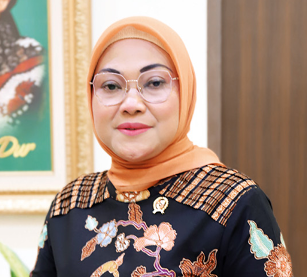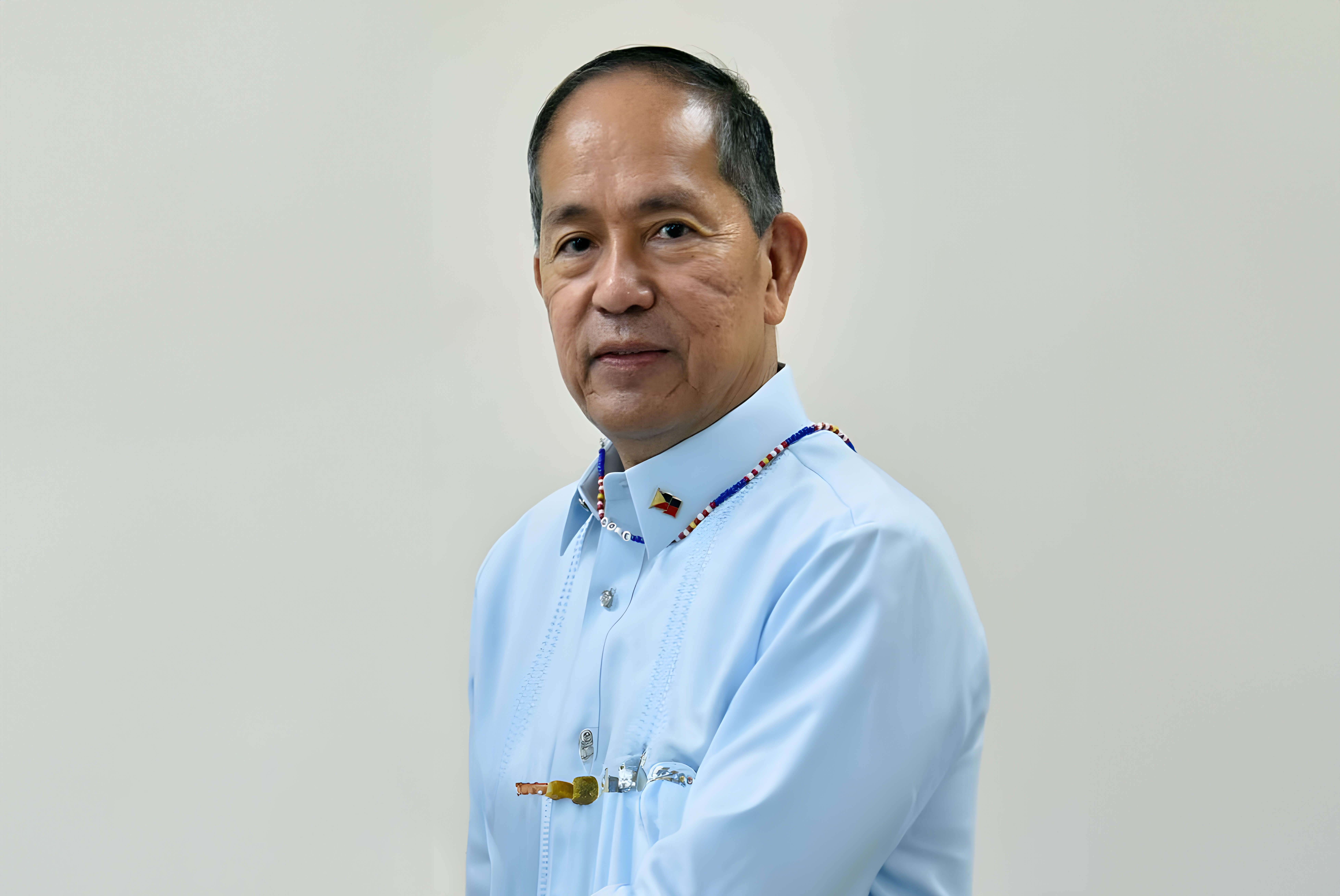


Minister Ida Fauziyah talks to The ASEAN about Indonesia's strategies for formalising work arrangements in Indonesia, the opportunities and threats presented by digitalisation on the country's informal sector, and efforts to address gaps in measuring and analysing informal employment. She also discussed the ongoing work of the ASEAN Labour Ministers Meeting to promote decent work and extend social protection to informal workers in the region.
Informal employment remains high in the many ASEAN Member States, including Indonesia. Can you share with us the strategies employed by the Indonesian government to ensure the transition of informal employment to formal employment, especially in micro, small, and medium scale enterprises (MSMEs)? What are the outcomes of these strategies? What are the remaining challenges?
In general, the percentage of Indonesian informal workers from 2010 to 2021 shows a declining trend, from 66.93 per cent to 59.45 per cent, respectively. Although in 2020, there was an increase in the percentage of informal workers due to the COVID-19 pandemic, this percentage was successfully lowered again in 2021. This demonstrates that pandemic conditions have no impact on the rate of formalisation of the Indonesian worker structure in the long term.
There are several obstacles to reducing the informalisation of Indonesian workers, as follows:
i. The low level of education of Indonesian informal sector workers. Around 76.11 per cent of the total 72.66 million workers with a junior high school education or less work in the informal sector (Statistics Indonesia or Badan Pusat Statistik/BPS, 2021). This indicates that workers with low education have relatively more difficulty entering the formal sector.
ii. The challenge of informal workers’ low level of education mentioned previously is complicated by the shifting need for work skills due to digitalisation. The World Economic Forum (2020) study shows that the skills needed in the future tend to be possessed by workers with relatively higher skills or education and mastery of digital technology, such as data scientists, data analysts, programmers, digital marketing, big data skills, strategic analysts, etc.
iii. The difficulty of encouraging labour formalisation in the agricultural sector. Of the total 37.13 million workers in the agricultural sector, around 88.43 per cent are informal workers (BPS, 2021).
iv. The difficulty of encouraging the formalisation of labour in rural areas. Around 72.41 per cent of 59.13 million rural workers are unemployed (BPS, 2021).
v. Female workers are more likely than male workers to become informal workers. Approximately 63.80 per cent of the total 51.79 million female workers are informal workers. Meanwhile, out of 79.26 million male workers, only about 56.61 per cent are informal workers (BPS, 2021).
vi. The manufacturing industry faces difficulties in absorbing formal-sector workers. As is well known, the manufacturing industry has contributed significantly to the formalisation of the workforce. Of the total 18.69 million workers in the manufacturing sector, around 62.41 per cent are formal workers (BPS, 2021). However, the manufacturing industry’s contribution to Indonesia’s Gross Domestic Product (GDP) shows a decline. In 2015, the contribution of the manufacturing industry to Indonesia’s GDP reached 20.84 per cent. This percentage decreased to 19.71 per cent in 2019 and 19.25 per cent in 2021 (BPS, several years).
vii. Informal sector workers outside Java also tend to be higher.
The Government of Indonesia has prepared a concrete strategy to address these challenges. The result has been a drop in the percentage of unemployed workers in 2021 despite the ongoing pandemic. From the demand side, the government carries out the following:
i. The Government adapts the strategy from Law Number 11/2020 on Job Creation. This law aims to increase job opportunities (particularly in the formal sector) by facilitating business transactions; protecting and empowering cooperatives and micro, small, and medium enterprises; improving the investment ecosystem; and central government investment and acceleration of national strategic projects. This is done to boost our worldwide competitiveness in attracting investors and formal employment development.
ii. Apart from the regulatory aspect, the government also provides other incentives for businesses to be able to create formal employment through a variety of development programmes, including infrastructure development (toll and non-toll roads, electricity, airports, clean water, etc.), capital assistance through Business Credit Assistance (Kredit Usaha Rakyat or KUR), village funds for rural agricultural economic development, and tax incentives for businesses.
iii. In the employment sector, special protection is provided in the form of a fairer minimum wage for workers and employers. The Wage Subsidy Assistance (Bantuan Subsidi Upah or BSU) helps ease the burden on businesses during the pandemic and prevent formal employment from eroding. There is also special protection for workers in micro and small businesses, which include wages that must be paid above the poverty line and a severance payment when employment is terminated.
iv. Furthermore, the government is also increasingly complementing employment social security. In addition to work accident insurance, death insurance, pension insurance, and old-age insurance, Indonesia currently also offers job loss insurance. This guarantee provides cash benefits, job market information, and job training benefits. This is to ensure that workers who are terminated will have better chances of reentering the formal sector.
From the supply side, the government promotes innovative programmes, such as pre-employment cards, independent learning programmes, competency-based training, community-based vocational training, training of prospective migrant workers, apprenticeships, and the development of young talents to improve the skills of the Indonesian workforce. All of these are done so that Indonesian workers’ skills can keep up with market demand and workers can have more opportunities to work in the formal sector.
These incentives have a significant impact on job creation. Data from the Investment Coordinating Board shows that domestic investment increased by 8.1 per cent and foreign investment increased by 10 per cent in 2021. The total Indonesian workforce absorbed as a result of this investment reached 2,364,254 people in the period 2020 and 2021 (Indonesian Investment Coordinating Board, 2022). In addition, the number of active participants in employment social security also continued to increase during the pandemic. In 2020, out of a total of 128.45 million workers, around 23.34 per cent are active participants of the Social Security Agency for Employment. This percentage increased to 23.40 per cent of the total 131.05 million working population in 2021 (BPS and Social Security Agency for Employment).
Several studies, including the recent Regional Study on Informal Employment Statistics to Support Decent Work Promotion in ASEAN, have recommended that the ASEAN Member States adopt an operational definition of informal employment and conduct regular collection and analysis of informal employment statistics for more targeted interventions. What progress has been made to implement these recommendations in Indonesia?
First, we should re-examine the definition of informal employment proposed in the study. By definition, informal employment includes i) workers who do not have access to at least one social security scheme or employment benefit; or ii) workers with at least one social security or employment benefit, but are self-employed or have self-owned informal enterprises; family or unpaid workers; self-employed workers who produce goods for their own/or their household; or workers who are not paid during annual leave, sick leave, and maternity/maternity leave. Agricultural sector work is not counted as informal employment.
Second, until now, the government has relied on the Statistics Indonesia definition of informal workers’ role in national development, particularly the National Mid-Term Development Plan (Rencana Pembangunan Jangka Menengah Nasional or RPJMN) and government work plan (Rencana Kerja Pemerintah or RKP) objectives. The definition of informal workers from Statistics Indonesia includes the following: i) self-employed, ii) selfemployed assisted by non-permanent workers, iii) casual workers in agriculture, iv) casual workers in non-agriculture, v) family/unpaid workers.
The definitions offered in the regional study and by the BPS show apparent similarities as follows: i) groups of self- employed and employers who work in their informal businesses, and self- employed workers who produce goods for their needs/or their households, which are included in the regional study are more or less in line with the BPS definition, such as groups of self-employed, trying to be assisted by workers/non-permanent workers, and casual workers in non- agricultural BPS version; ii) groups of family/unpaid workers are included in both definitions.
A very striking difference in the definitions is the access to one type of social security or employment benefit. In light of this distinction, it is important to clarify if “social security,” in this context, also refers to health insurance. Indonesian formal workers are estimated to be just 23.40 per cent if access to employment social security is confined to active participants.
As a result, Indonesia must exercise extreme caution and thoroughly examine the definitions presented in the regional study. The definition is important because it will decide how Indonesia’s labour market develops. Therefore, an in-depth study of this proposed definition is very important considering that:
i. Along with the demographic bonus, Indonesia has the largest workforce in ASEAN that will reach 140.15 million people in 2021 (BPS, 2021).
ii. From the ethical point of view of public policy, it is not appropriate if agricultural informal workers are excluded as informal workers. This is an important matter considering that 28.33 per cent of Indonesian workers are engaged in the agricultural sector (BPS, 2021). In addition, considering that the agricultural sector tends to be in rural areas, the relatively high poverty rate, at 12.53 per cent, also needs to be taken into consideration (BPS, 2021).
iii. It is necessary to calculate the additional burden on the informal micro, small, and medium scale business sector, as well as the State/Regional Budget (APBN/APBD) f iscal space if the effort to pursue the formalisation of workers is carried out through the active participation of social security.
iv. Digitalisation facilitates the development of independent workers or entrepreneurs by making working connections more fluid. In fact, these workers are included in the group of informal workers when referring to the definition used in the regional study.
According to the BPS definition of informal workers, Indonesia already has a database that is updated twice a year through the National Labor Force Survey. This information is provided at the provincial, district, and city levels. Of course, other data sources related to the dynamics of the discourse on the definition of informal workers, such as Social Security Agency for Employment data on wage and non-wage recipients, data for formal/ informal migrant workers based on job order characteristics, or data for formal/ informal migrant workers based on internal or external criteria, are supplemented by these data.
Based on all the explanations above, so far, the national development agenda regarding the reduction of Indonesian informal workers still adheres to the definition from BPS.
Progress has been made to implement the regional study’s recommendations on informal employment statistics to support decent work promotion in ASEAN, as follows:
i. Strengthening database on informal employment. Indonesia continues to update the statistical database of informal workers, in addition to getting more real data based on conditions in the field. The Ministry of Manpower has created a digital employment ecosystem that can be used to build a database of workers in the informal sector. Indonesia has one employment data that is ready to work.
ii. Inter-agency committee on informal employment. The Ministry of Manpower collaborated with the Ministry of Education and Culture; Ministry of Cooperatives, Micro, Small and Medium Enterprises; regional governments; universities; and companies on a region-based job opportunities expansion programme.
iii. Formalising the operational definition of informal employment. Indonesia’s definition of informal employment is explained in the previous section.
iv. Improving country reports on informal employment. Indonesia has a National Labor Force Survey (Survey Angkatan Kerja Nasional or Sakernas) which is conducted every semester.
v. Institutionalising the use of informal employment statistics. Statistical data related to informal sector workers produced by BPS always serve as a reference and as a basis for analysis in policymaking, programme intervention, and the adjustment of Indonesian regulations.
vi. Establishment of the regional database. Indonesia already has regional-based data within the scope of provinces and districts/cities.
vii. Expanding the list of informal employment indicators in the future. The probability of expanding the indicators of informal sector workers in the future will certainly remain in line with the dynamics of the informal sector that continues to change, especially due to digitalisation.
What are the opportunities and challenges presented by digitalisation in the informal sector of Indonesia and this region? What can be done to promote the well-being of the growing number of workers in online platforms and other digital-based enterprises?
Advancements in digital technology have driven the growth of the digital economy with a distinctive pattern of work relations. The digital economy, especially through digital platform workers, has eliminated certain types of jobs, but created new ones. In addition, the COVID-19 pandemic situation has encouraged various sectors to adapt quickly to changes in people’s habits. Conventional activities are now 10 carried out with digital systems, such as shopping, payment transactions, and transportation, and many have switched to using digital technology. In response to this, the Government of Indonesia will certainly be open to the possibility of improving regulations and adapting to changes to support the welfare and protection of workers.
McKinsey (2016) stated that Indonesia has the opportunity to increase the value of the national economy to reach 150 billion US dollars by 2025 due to digitalisation. This is the effect of three things: an increase in the level of labour force participation due to the digitisation process, an increase in productivity through digitalisation, and the cumulative potential related to economic sectors that grow due to digitalisation. A recent study from East Ventures (2022) also shows that Indonesia’s digital economy will reach 4,531 trillion rupiah in 2030. This is because 73.3 per cent of Indonesia’s population currently uses the internet; the income from e-commerce businesses grew by 24.4 per cent in 2021; and online shopping increased from 17.5 per cent before the period pandemic to 25.5 per cent after the pandemic. All of these show that Indonesia has tremendous opportunities in developing the digital economy.
However, the World Bank study (2021) actually reminds us that there are still problems and challenges related to the digital divide. The said study shows that, in fact, only 1.2 million Indonesian workers can actually be categorised as digital gig workers. They are usually relatively young (mean age is 35 years), 87 per cent are in urban areas, 74 per cent have upper secondary education, and 85 per cent are male. The exclusivity of the digital economy in urban areas also aligns with the results of the East Ventures study (2022) which shows that Jakarta province ranked first in the digital competitiveness index for two consecutive years, 2021 and 2022.
In fact, it has been mentioned previously that informal workers in Indonesia tend to be higher in rural areas and the most vulnerable are workers with relatively low education and women. All of these show that Indonesia has a lot of homework to do to encourage inclusiveness in the digital economy era, especially in relation to the existence of businesses and informal sector workers.
There are a number of things that need to be done to improve the welfare of workers in the digital era, especially in the informal sector as follows:
i. Workers must have good digital capital, such as a set of technical competencies in the use of digital technology that can increase their income. This requires a digital technology infrastructure and improvement of digital technology skills through formal education, non-formal education, or vocational training that are easily accessible throughout Indonesia. In addition, market access to workers’ products/ outputs needs to be opened.
ii. The Indonesian government does not only provide welfare for workers through the aspects of social security and wage, but also many other instruments to improve the welfare of workers, such as: maintaining stability in price increases for strategic commodities (food, clothing, housing, transportation, education, etc.), various subsidy programmes (social assistance, wage subsidies, fuel subsidies, fertiliser subsidies, financial aid, etc.), opening access to capital credit and consumption credit, reducing costs in the logistics chain, etc. Thus, employment social security and wages are not the only government instruments to improve the welfare of workers and their families in the digital economy era.
Indonesia encourages digital platform service providers to ensure that their partner workers are protected in the employment social security programme. Workers/Partners on digital platforms are categorised in the Non-Wage Recipient Participant (Informal) segment. Participation in this segment experienced a significant increase, from 2,494,994 in 2020 to 3,551,858 in 2021 (29.76 per cent) (Social Security Agency for Employment, several years).
The Indonesian government has a Pre- Employment Card programme that can provide benefits for platform workers to access protection in the event of a disruption. The benefits of this programme are job and entrepreneurial training, cash and entrepreneurial access, and job market access.
Can you share some of the key ALMM initiatives and accomplishments to promote decent work and extend social protection to informal workers in the region?
Building through cooperation and common interest and priorities shared among the ASEAN Member States, the ASEAN Labour Ministers’ Work Programme 2016-2020 envisioned “a better quality of life for ASEAN people through a workforce with enhanced competitiveness and engaged in safe and decent work derived from productive employment, harmonious and progressive workplace, and adequate social protection.”
This objective continues to guide the ASEAN Labour Ministers’ Work Programme for 2021-2025, which is expected to attain four key result areas as follows: skilled and adaptable workforce; productive employment; harmonious, safe and progressive, workplace; and expanded social protection.
Meanwhile, the ALMM had accomplished key deliverables in supporting the promotion of decent work and extending social protection to informal workers in the region. The ASEAN Leaders adopted the Vientiane Declaration on Transition from Informal Employment to Formal Employment towards Decent Work Promotion in ASEAN in September 2016. It is one of the of many substantial documents that formed the basis for pursuing the transformation of informal employment into formal employment.
The implementation of the Vientiane Declaration, through its Regional Action Plan, has brought about, among others, the Regional Study on Informal Employment Statistics to Support Decent Work Promotion in ASEAN. The study provides evidence-based assessment and recommendations to understand better the trends of informal employment in the region and its correlation with decent work conditions, as well as to improve the responsiveness of policies to address the situation of informal employment. Recently, Senior Labour Officials Meeting had endorsed the Study Report on Decent Work Promotion in Rural Economy through Productivity Growth, Local Employment Promotion and Transition from Informal to Formal Employment. This report looks into decent work promotion through productivity growth, local employment promotion, and transition from informal to formal employment.
Furthermore, to achieve decent work in the region, ASEAN cooperation on labour is committed to ensure productive employment and decent work that respond to crises. These include disruptions and uncertainties caused by the COVID-19 pandemic and disruptions caused by the fourth industrial revolution in the world of work and labour conditions. The ASEAN Declaration on Promoting Competitiveness, Resilience and Agility of Workers for the Future of Work was adopted by ASEAN Leaders at the 38th ASEAN Summit in October 2021, securing ASEAN’s commitment to “build back better” the labour and employment conditions in the region in the aftermath of the pandemic crisis.








